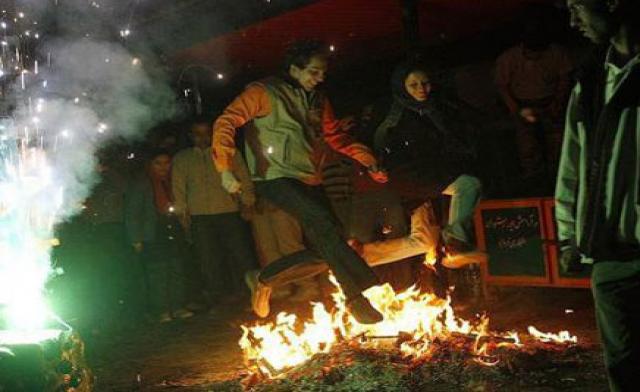
by Azita Carlson
In Iran, Nowruz — the New Year — is marked by the Spring equinox, which falls on March 20th, this year. Before the Iranian people can welcome in the New Year, though, they must bid farewell to Winter by observing the national day of Charshanbeh Soori as it is called in Farsi, the language of Iran. This annual celebration, held on the last Tuesday of the year, is called the Fire Festival in English, and has been commemorated by Iranians for thousands of years.
The Fire Festival follows the tradition of the ancient Zoroastrian religion, which is is based on the belief that the world is a battleground between good and evil forces, represented by the duality of light and darkness. Bonfires are lit in the streets, and the people jump over them, singing and chanting, “Let your ruddiness be mine, my paleness be yours.” Fireworks play a large part in the celebration. There is also a tradition similar to the West’s “trick or treating” that is called spoon-banging, when children in disguises visit neighbors and receive snacks.
Iran’s religious authorities frown upon public mingling of unmarried men and women. In an effort to discourage Charshanbeh Soori, police and security forces have warned residents to refrain from participating in the festival. Despite the regime’s intimidations since 1979, Iranians manage to defeat impediments and continue their rich traditions each year. However, this has turned Charshanbeh Soori into a crisis between the Iranian public, particularly the youth, and the theocratic regime’s security forces.
After the uprising that spread across Iran in December and January, the Iranian people are preparing for Charshanbeh Soori to be another opportunity to raise their voices in defiance.
The MEK/PMOI, the major opposition group to the regime, whose supporters spearheaded the uprisings of the past few months, has called for participation in “Dictator on Fire,” a movement that has scores of resistance cells in various Iranian cities who have promised to respond to the regime’s suppression with active participation in the Fire Festival, and to demand the regime’s overthrow.
By organizing resistance to regime repression, the MEK/PMOI in has shifted the balance of power on Iran’s streets. The unrest in Iran continues, as the people no longer fear the regime. While the world watches, the Iranian people can welcome in a true Iranian spring, and bid farewell to the regime that it has victimized them for so long.







